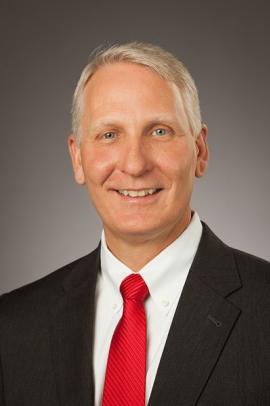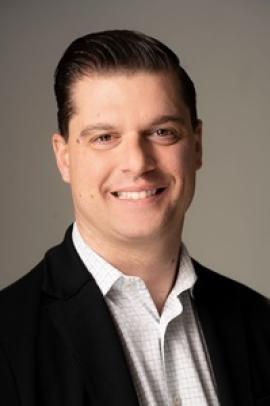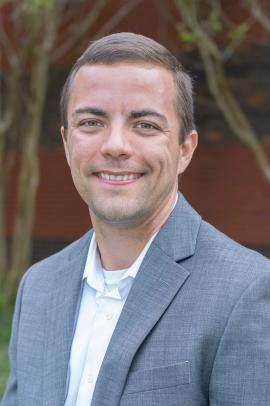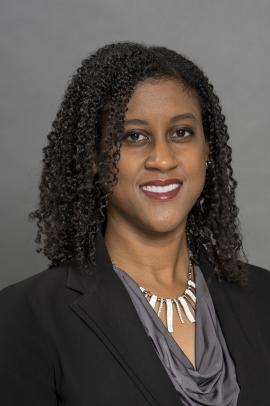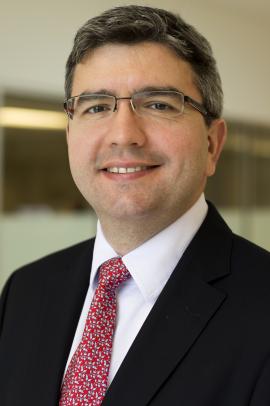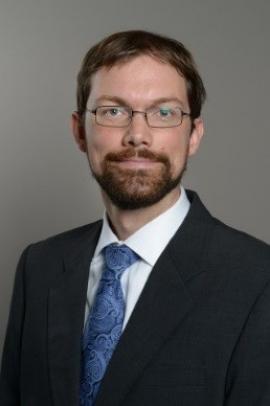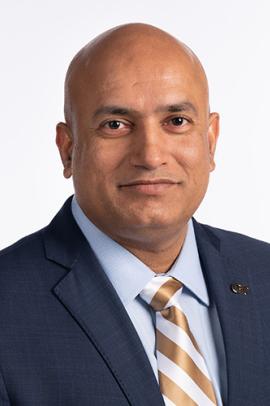Wisconsin Alpha Theta
Platteville, WI 53818
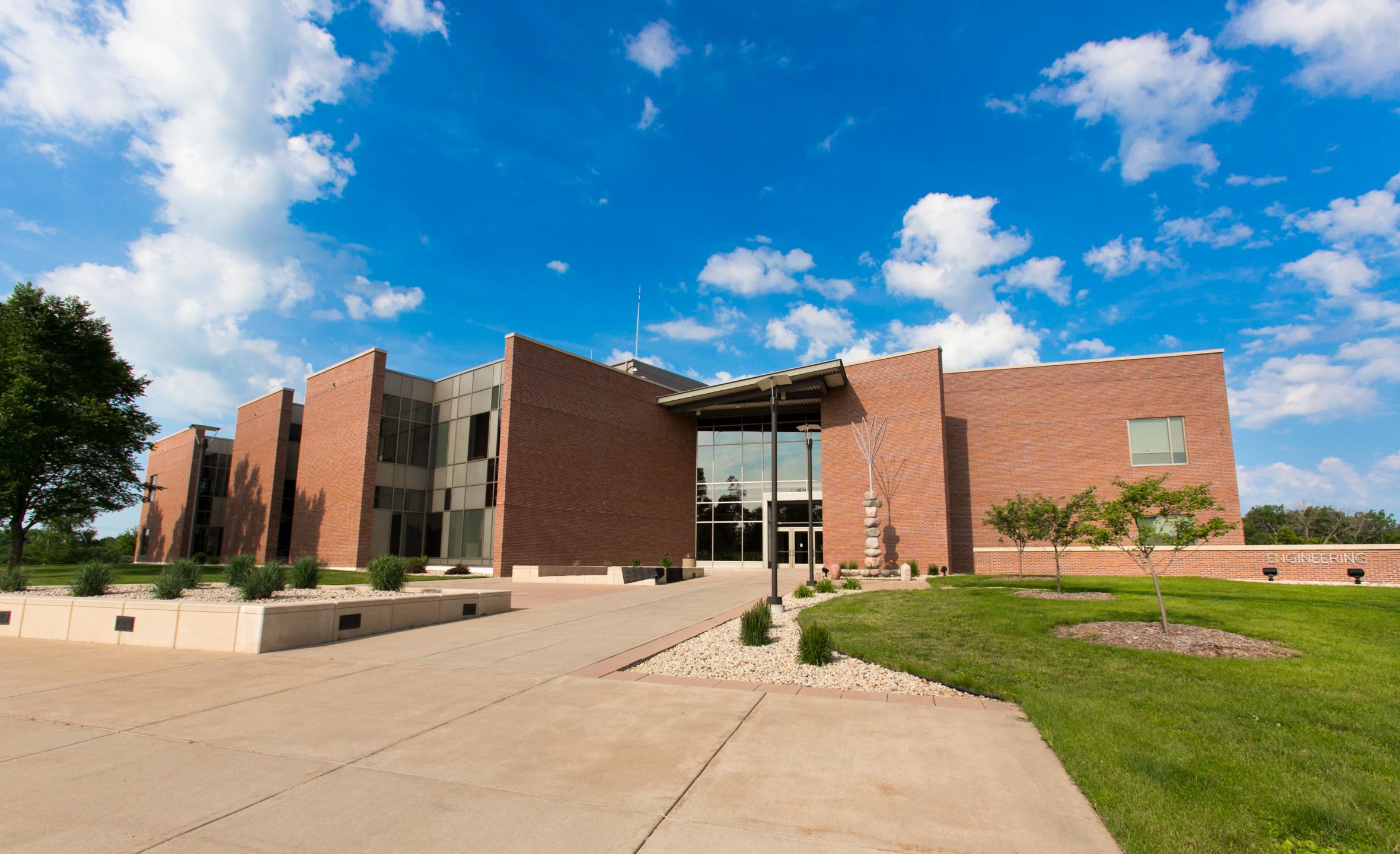
A petition, dated October 22, 1992, for a Pi Tau Sigma chapter charter was submitted to Pi Tau Sigma by faculty and students at the University of Wisconsin-Platteville, in Platteville, Wisconsin. Dr. Tamer Ceylan worked diligently in getting the petition processed and the installation organized. Eighteen students and eleven faculty member endorsed the petition, including Dr. Richard Strunk, chairman of the department. The petition was enthusiastically supported also by Dean Ronald Yeske
On April 23, 1993 Wisconsin Alpha Theta was officially installed by President, Dr. S. P. Kezios, Central Regional Vice President, Dr. Prasana Kadaba, and National Secretary Treasurer; Dr. Edwin Griggs. Thirty-two students were initiated as charter members.
ANNUAL SUMMARY REPORTS
2021-2022, Sam Bauman, President
This year the Wisconsin Alpha Theta chapter saw a return to normal in person activities with the easing of covid-19 restrictions. The chapter’s focus for the year was developing programming for the University of Wisconsin-Platteville’s annual Engineering, Math, and Science (EMS) Expo. This event provides students ranging from 5th to 12th grade the opportunity to gain hands-on experience with STEM related projects developed by UW-Platteville student groups and professors. The goal is to get students excited about STEM and potentially encourage them to pursue related career paths. Like in past years, the chapter selected and carried out an engineering design project to be showcased at this event. Not only does this provide a great educational experience for students interacting with the project at EMS expo, it also provides valuable design and teamwork experience for members of the chapter involved with the development of the project.
The idea for this year’s project was brought to the chapter by our project sponsor Oshkosh Corporation who develops defense vehicles for the US Military. The goal of the project was to develop a hands-on demonstration fixture for educating kids on how different suspension systems work. The fixture we created allows for two different suspension models to be set into motion at the turn of a hand crank allowing for easy visualization of the systems at work.
To model the suspension systems, the chapter received suspension CAD models developed by Oshkosh Corporation. Using these CAD models for reference, we designed scaled suspension components that could be 3D printed and assembled into a working suspension system for use on the demonstrator. Our goal when designing the components was to model the Oshkosh designs as accurately as possible. This way, benefits, and limitations of different aspects of each suspension design could be highlighted. Following the design phase of the project, all manufacturing was carried out by members of the chapter utilizing the UW-Platteville campus shops and 3D printing labs.
Once the project was complete, it was showcased at the EMS expo. In addition to the demonstration fixture, a poster was created to document the design and manufacturing processes involved in the project. The poster also included educational information related to different types of suspension systems and the manufacturing processes used throughout the course of the project. To conclude the project, the chapter got the chance to travel to Oshkosh Corporation’s headquarters in Oshkosh, WI. While there, we were given an in-depth tour of the facility, we presented the project to employees of the company, and got a test ride in a JLTV on Oshkosh’s on-site test course. The JLTV is a truck produced by Oshkosh corporation that has replaced the Humvee for use by the US military. This truck utilizes Oshkosh’s TAK-4 independent suspension system that we modeled for use on our demonstration fixture. Getting to experience first-hand the suspension system we had been modeling for our project was an amazing experience and undoubtedly a highlight of the year.
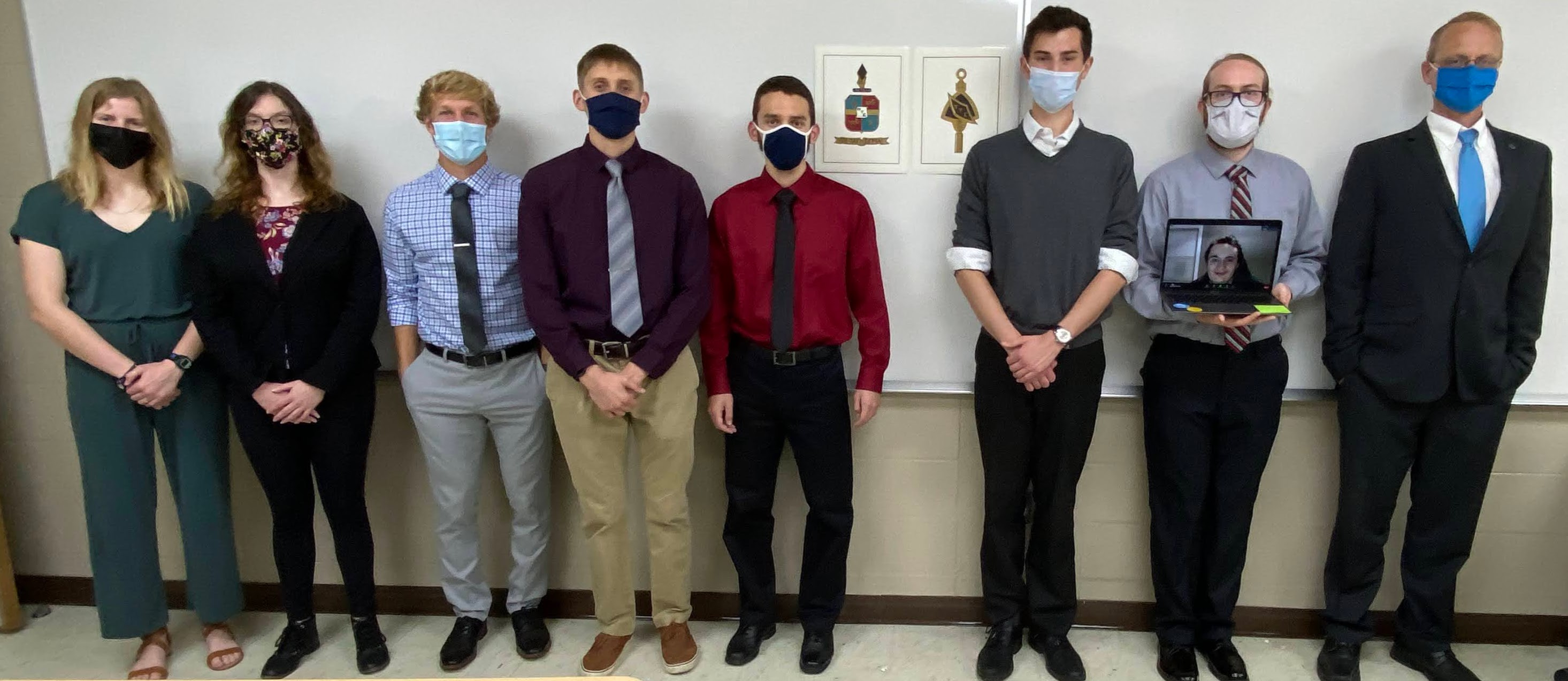
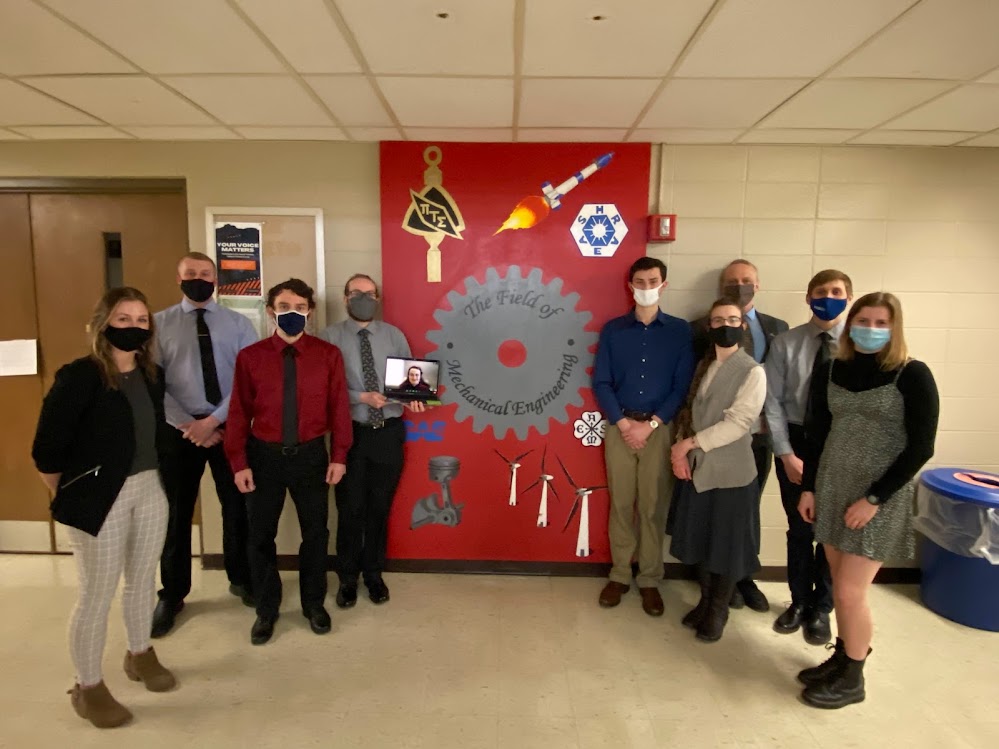
2020-2021, Alexis Richardson, President
Like many other chapters this year, the Wisconsin Alpha Theta chapter was tasked with adapting our traditional programming to a virtual format. At the core of our chapters structure, we are dedicated to developing programming at the University of Wisconsin – Platteville’s annual Engineering, Math, and Science (EMS) Expo. This event provides 5th through 12th grade students the opportunity to have hands-on experience with research projects, students, and professors.
For the 2021 Virtual Engineering Expo, Pi Tau Sigma presented the softball pitching machine that we prepared for last year’s expo. We redesigned this pitching machine to improve the speed, accuracy, and transportation abilities based off an existing model. The prototype machine was featured in a video explaining both the function and the design process of the machine. The students were be introduced to key engineering concepts involved in the design process and utilize what they learn in a short design challenge. These videos included a brief explanation of the application of generative design, manufacturing processes, reverse engineering, spring force, and projectile motion within our design.
Not only were the virtual attendees of the expo provided with the virtual programming we developed, but they also had an “engineering kit” mailed to them. This kit included popsicle sticks, rubber bands, plastic spoons, and cotton balls. This provided the opportunity to maintain the hands-on experience they would have had if the expo were in person. This also allowed them to apply what they learned about the topics presented. For example, to better understand spring force, the students were encouraged to vary the number of rubber bands used in their catapult and document the resulting change in projectile distance.
One benefit discovered of creating virtual content was that the content can be saved and used again in the future. Our chapter is sponsored by Oshkosh Corporation. Their support is critical to the success of our projects. In addition to their financial contributions, our weekly design reviews help to improve our designs and make our programming more effective. Our contribution to this partnership, is that they get to keep our prototype along with a summer poster for the STEM outreach endeavors. Since our presentations were virtual this year, the recordings were formatted on a QR code on the final poster. This allows future presenters to answer more specific questions about the design process, as they will have access to the students who designed the pitching machine at their fingertips.
2019-2020, Michael Nelson, President
Although unconventional, this year was an exciting one for our chapter. At University of Wisconsin-Platteville, our chapter is small—only 10-15 active members. Due to our small numbers, we were busy with this year’s project and attending the national convention. Our chapter, Wisconsin Alpha Theta, designs and builds a unique project each academic year. This year, our team chose to build our own spring-powered softball pitching machine. There are several models available for purchase online; however, we felt that these designs were inadequate in terms of safety, adjustability, and overall power. We redesigned from the ground up considering portability, usability, safety, accuracy, and pitching distance.
Our first change was to upgrade from one spring to two to balance the machine and increase power. The trigger mechanism was also improved to allow the user to lock the throwing arm back easily and safely. The throwing cup was the biggest step forward for our chapter. At the Pi Tau Sigma national convention, we learned about Autodesk Fusion 360’s generative design feature. This concept allows the computer to come up with potentially hundreds of different variations of the same generic component, allowing the engineer to prioritize manufacturability, weight, and strength while maintaining required geometry. This allowed us to come up with an advanced throwing cup design for our pitching machine significantly faster than anyone on our team could have come up with by themselves. The cup is adjustable to different positions along the length of the throwing arm to change both throwing distance and velocity.
All of this is possible with the support of our sponsor, the Oshkosh Corporation. Our chapter has initiated and maintained a strong, healthy relationship with this company over the last three years. Oshkosh helps us in design decisions, project scheduling, and construction guidance. Every week, a team of engineers, some of whom are UW-Platteville alumni, meet remotely with members of our design team to discuss different aspects of our annual project. The project is all geared towards the annual UW-Platteville Engineering, Math, and Science Expo in the middle of the spring semester. Sadly, this year’s Expo was cancelled due to the pandemic. However, the team had already completed most of the project before the campus was shut down. We were disappointed that we were unable to present our final product at the Expo, but we are eager to present both this year’s and next year’s projects at the spring 2021 Expo.
In addition to the project, seven of members flew out to Rochester, NY in January of this year to attend the annual Pi Tau Sigma National Convention. We all really enjoyed the tours, speakers, and great atmosphere that the RIT chapter provided us. We really appreciate all the hard work that went into such an effort and are glad that we were able to attend such a gathering.
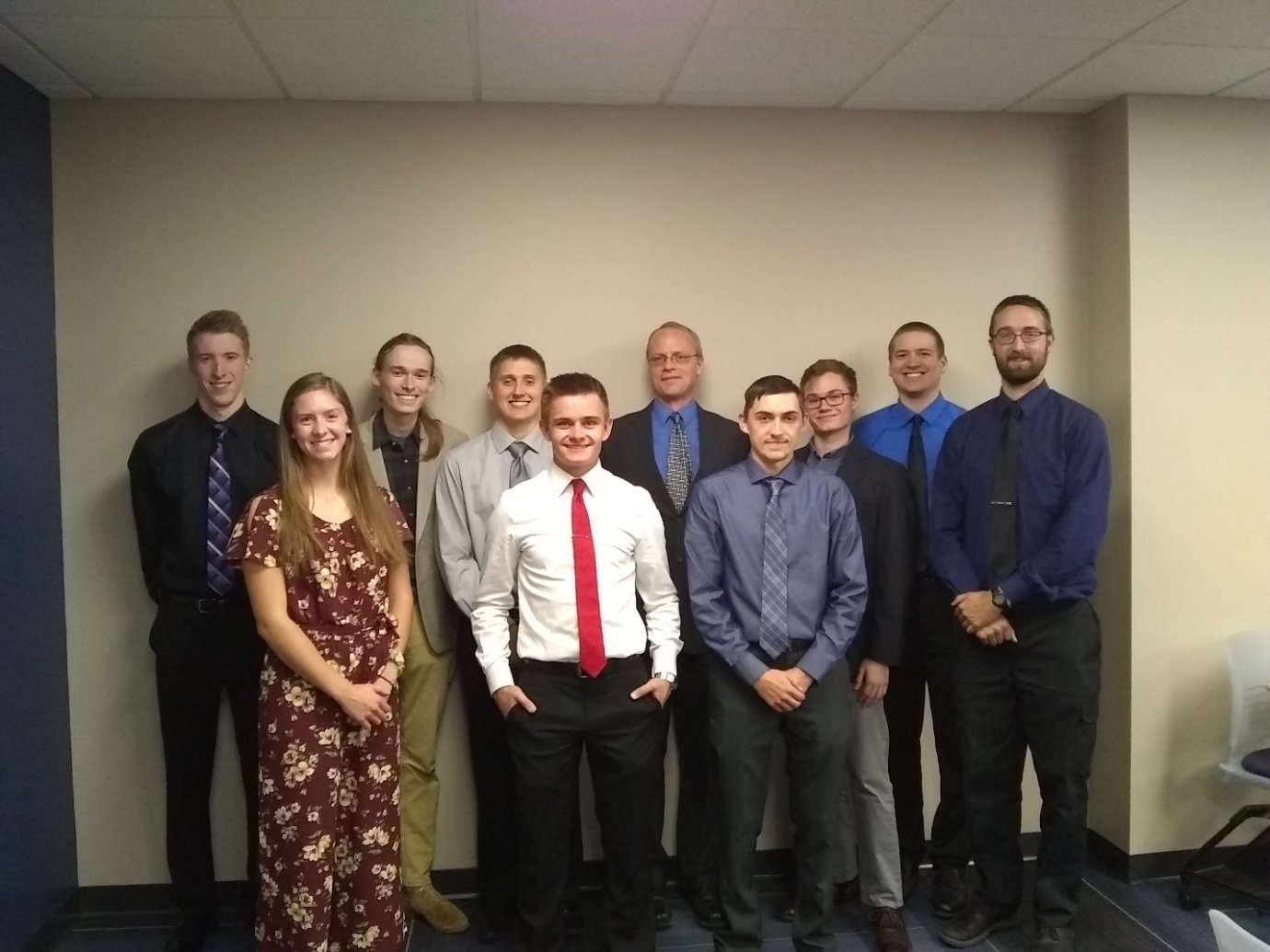

2018-2019 Andrew Splitt, President
During the Fall 2018 and Spring 2019 academic year at University of Wisconsin Platteville, Wisconsin Alpha Theta chapter focused on developing the organization to appeal to more university students in two ways: marketing the strong leadership and experience of the executive board; and offering meaningful design projects to enhance their engineering abilities. Pi Tau Sigma held 9 general meetings that occurred monthly, gathering all members of the organization. The general meetings consisted of: completing any paperwork or voting required on a national and chapter level; and serving as a time for networking and socialization between the members. Our chapter also held design meetings at least once every week throughout the academic year. The design team(s) attending these meetings were member volunteers from the organization that wanted to enhance their experience in the engineering profession by working together to brainstorm, design, fabricate, test, and display a project of the organization’s selection. The project is displayed at the University of Wisconsin-Platteville’s annual Engineering Expo event that is visited by over a thousand local middle and high school students every spring.
The project theme chosen for this 2018-2019 academic year was a electrically powered go-kart. The technology featured was a electrically regenerative braking system that was applied to an old ASME go-kart. Powered by a 2 kW motor, Pi Tau Sigma used a controller to convert the motor to an electric generator upon flipping a switch to initiate the electric regeneration system. This allows the current to reverse inside the motor and instead of taking electrical energy from the battery, the motor sends energy from the axle back to the battery causing the go-kart to slow down. This project was sponsored by Oshkosh Corporation (a Fortune 500 company). Oshkosh Corporation provided monetary funding as well as support throughout the Spring 2019 semester with the manufacturing process and electrical industry knowledge. Our chapter held about 10 design-specific meetings with representatives from Oshkosh Corporation. The final product was designed and produced by our organization throughout the 2018-2019 academic school year. This final product was presented at the facilities of Oshkosh Corporation on Monday, April 29th, 2019.
This connection to Oshkosh Corporation has established a STEM program to help elementary to high school students in northeastern Wisconsin learn about STEM and want to pursue careers in the field. Pi Tau Sigma’s current and previous projects are displayed in the newly-built STEM bay at Oshkosh Corporation’s headquarters in Oshkosh, Wisconsin. Through this connection, Pi Tau Sigma students are given opportunities inside the organization.
In addition to project involvement, our chapter also attended the 2019 National Convention in Fort Collins, Colorado. Six representatives (E-board and two design team members) from the organization were sent to represent the chapter. In addition, the organization held multiple speakers from John Deere, as well as taking tours of both Woodward, Inc and Phoenix Nuclear Labs. Tours and speakers were open to all members of Pi Tau Sigma, while the design team members lead the electrical regenerative system project for Oshkosh Corporation.
2017-2018 Zander Gunderson, President
During the Fall 2017 and Spring 2018 academic year at University of Wisconsin Platteville, Wisconsin Alpha Theta chapter focused on developing the organization to appeal to more university students in two ways: marketing the strong leadership and experience of the executive board; and offering meaningful design projects to enhance their engineering abilities. Pi Tau Sigma held 9 general meetings that occurred monthly, gathering all members of the organization. The general meetings consisted of: completing any paperwork or voting required on a national and chapter level; and serving as a time for networking and socialization between the members. Our chapter also held design meetings at least once every week throughout the academic year. The design team(s) attending these meetings were member volunteers from the organization that wanted to enhance their experience in the engineering profession by working together to brainstorm, design, fabricate, test, and display a project of the organization’s selection. The project is displayed at the University of Wisconsin-Platteville’s annual Engineering Expo event that is visited by over a thousand local middle and high school students every spring.
The project theme chosen for this 2017-2018 academic year was hydraulic powered machines. The main project was a hydraulic regenerative braking system that was applied to a street bike. This project was sponsored by Oshkosh Corporation (a Fortune 500 company). Oshkosh Corporation provided monetary funding as well as support throughout the Spring 2018 semester with the manufacturing process and hydraulic industry knowledge. Our chapter held about 10 design-specific meetings with representatives from Oshkosh Corporation. The final product was designed and produced by our organization throughout the 2017-2018 academic school year. This final product was presented at the facilities of Oshkosh Corporation on Thursday, May 3rd, 2018.
Our second project was a hydraulic powered claw machine. This project was a smaller, additional project for some of the new initiates to take a larger role on a project outside of coursework. The project consisted of a 3D printed claw that picked up candy inside of a designed wooden-frame, rectangular container with acrylic sheets as viewing windows. The claw was powered by four separate tube lines to move the claw appropriately in the -x, -y, and -z directions as well as opening/closing of the claw.
In addition to project involvement, our chapter also attended the 2018 National Convention in Miami, Florida. Two representatives (President and Treasurer) from the organization were sent to represent the chapter. The two representatives attended the various events that the national convention offered this year, such as: business meetings with national chapter advisors, an Engineering Futures presentation, the sponsored Autodesk design competition, lab tours through facilities at the University of Miami, and the keynote speaker, Dr. Yvonne Cagle, MD.
In terms of fundraising and extra activities, our organization held a hotdog sale. The was to raise funds to send more members to the national convention in 2019. As well, our chapter attended a company plant tour, hosted by 3M, and hosted a guest speaker from Jacobs Engineering company.

